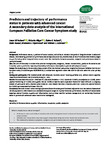Predictors and trajectory of performance status in patients with advanced cancer: A secondary data analysis of the international European Palliative Care Cancer Symptom study
| dc.contributor.author | Boland , Jason | |
| dc.contributor.author | Allgar, Victoria | |
| dc.contributor.author | Boland, EG | |
| dc.contributor.author | Kaasa, S | |
| dc.contributor.author | Hjermstad, MJ | |
| dc.contributor.author | Johnson, Miriam | |
| dc.date.accessioned | 2021-08-09T11:22:56Z | |
| dc.date.available | 2021-08-09T11:22:56Z | |
| dc.date.issued | 2019-02 | |
| dc.identifier.issn | 0269-2163 | |
| dc.identifier.issn | 1477-030X | |
| dc.identifier.uri | http://hdl.handle.net/10026.1/17474 | |
| dc.description.abstract |
<jats:sec><jats:title>Background:</jats:title><jats:p> Performance status, a predictor of cancer survival, and ability to maintain independent living deteriorate in advanced disease. Understanding predictors of performance status trajectory could help identify those at risk of functional deterioration, target support for independent living and reduce service costs. The relationship between symptoms, analgesics and performance status is poorly delineated. </jats:p></jats:sec><jats:sec><jats:title>Aim:</jats:title><jats:p> The aim of this study is to determine whether demographics, analgesics, disease characteristics, quality-of-life domains and C-reactive protein predict the trajectory of Karnofsky Performance Status (KPS) in patients with advanced cancer. </jats:p></jats:sec><jats:sec><jats:title>Design:</jats:title><jats:p> The study design is the secondary data analysis of the international prospective, longitudinal European Palliative Care Cancer Symptom study (ClinicalTrials.gov: NCT01362816). A multivariable regression model was built for KPS area under the curve per day (AUC). </jats:p></jats:sec><jats:sec><jats:title>Setting and participants:</jats:title><jats:p> This included adults with advanced, incurable cancer receiving palliative care, without severe cognitive impairment and who were not imminently dying ( n = 1739). </jats:p></jats:sec><jats:sec><jats:title>Results:</jats:title><jats:p> The mean daily KPS AUC ( n = 1052) was 41.1 (standard deviation = 14.1). Opioids ( p < 0.001), co-analgesics ( p = 0.023), poorer physical functioning ( p < 0.001) and appetite loss ( p = 0.009) at baseline were explanatory factors for lower KPS AUC. A subgroup analysis of participants with C-reactive protein data ( n = 240) showed that only C-reactive protein ( p = 0.040) and physical function ( p < 0.001) were associated with lower KPS AUC. </jats:p></jats:sec><jats:sec><jats:title>Conclusion:</jats:title><jats:p> This study is novel in determining explanatory factors for subsequent functional trajectories in an international dataset and identifying systemic inflammation as a candidate therapeutic target to improve functional performance. The effect of interventions targeting physical function, appetite and inflammation, such as those used for cachexia management, on maintaining functional status in patients with advanced cancer needs to be investigated. </jats:p></jats:sec> | |
| dc.format.extent | 206-212 | |
| dc.format.medium | Print-Electronic | |
| dc.language | en | |
| dc.language.iso | eng | |
| dc.publisher | SAGE Publications | |
| dc.subject | Karnofsky Performance Status | |
| dc.subject | appetite | |
| dc.subject | inflammation | |
| dc.subject | neoplasms | |
| dc.subject | opioids | |
| dc.subject | analgesics | |
| dc.title | Predictors and trajectory of performance status in patients with advanced cancer: A secondary data analysis of the international European Palliative Care Cancer Symptom study | |
| dc.type | journal-article | |
| dc.type | Journal Article | |
| dc.type | Research Support, Non-U.S. Gov't | |
| plymouth.author-url | https://www.webofscience.com/api/gateway?GWVersion=2&SrcApp=PARTNER_APP&SrcAuth=LinksAMR&KeyUT=WOS:000456449800009&DestLinkType=FullRecord&DestApp=ALL_WOS&UsrCustomerID=11bb513d99f797142bcfeffcc58ea008 | |
| plymouth.issue | 2 | |
| plymouth.volume | 33 | |
| plymouth.publication-status | Published | |
| plymouth.journal | Palliative Medicine | |
| dc.identifier.doi | 10.1177/0269216318811011 | |
| plymouth.organisational-group | /Plymouth | |
| plymouth.organisational-group | /Plymouth/Faculty of Health | |
| plymouth.organisational-group | /Plymouth/Faculty of Health/Peninsula Medical School | |
| plymouth.organisational-group | /Plymouth/REF 2021 Researchers by UoA | |
| plymouth.organisational-group | /Plymouth/REF 2021 Researchers by UoA/UoA01 Clinical Medicine | |
| plymouth.organisational-group | /Plymouth/Research Groups | |
| plymouth.organisational-group | /Plymouth/Research Groups/Plymouth Institute of Health and Care Research (PIHR) | |
| plymouth.organisational-group | /Plymouth/Users by role | |
| plymouth.organisational-group | /Plymouth/Users by role/Academics | |
| dc.publisher.place | England | |
| dc.identifier.eissn | 1477-030X | |
| dc.rights.embargoperiod | Not known | |
| rioxxterms.versionofrecord | 10.1177/0269216318811011 | |
| rioxxterms.licenseref.uri | http://www.rioxx.net/licenses/all-rights-reserved | |
| rioxxterms.type | Journal Article/Review |


